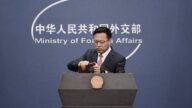【新唐人2011年2月15日讯】在北京报摊,报章的头版头条虽然是穆巴拉克交权,但内容却不提穆巴拉克交权的原因,将他倒台归于经济政策失败,而不提民主反独裁。不过中国网民翻墙到被大陆封锁的Youtube,Twitter,Facebook上,了解到埃及的最新动态,并发起向埃及领事馆献茉莉花的活动,以庆祝民主的成功。
“请到埃及大使馆献一束茉莉花,你会得到永久的幸福!”这条呼吁在中文Twitter上流传,呼吁者并要接受信息者复制下传5到10个人。这是大陆网民发起“全民献花活动”行动,相约向埃及驻华使馆和办事处献茉莉花,以祝贺埃及人民结束专制获得自由。
不过,埃及的成功带给中国人的不仅是欢庆。浙江民主人士朱虞夫表示,当听到埃及内政部和外交部官员们说,这里不是“天安门广场”,这里不会发生“天安门”这样的事情时,有的人流泪了。如果八九年“六四”当时,有新兴的网络媒体,一切会不会不一样呢?
在当前,破网工具和社区网站迅速发展下,“信息封锁”已经变得不可能了。埃及当局多次试图阻碍自由通讯,但是各种消息总是能找到渠道传播出来。当埃及政府将国内的因特网和移动电话网切断时,Twitter在埃及推出了可以通过电话留下短消息的服务;而在中国,网民也翻墙到被大陆封锁的Youtube,Twitter,Facebook上了解埃及的最新动态,并传递中国民主人士的声音。
格雷.奥德里﹝加州大学欧文分校商学院讲师﹞:“我们已经看到Facebook、Twitter, 和其他的一些社群网络在突尼斯和埃及的改革中成为重要的互通讯息的工具。我想其他一些中东独裁政府也开始意识到这点,叙利亚,约旦,和业门甚至已经对人民要求的正义作出一些让步,那么中东以外的独裁国家,尤其是中共,很可能会面临同样的问题。我想歇斯底里的中共会使用一贯技俩,加强网路封锁。而这个决定恰恰是搬石头打自己的脚。”
去年年底,Facebook的创始人、CEO马克.扎克伯格访问中国,似乎有意进军中国市场。外界担心Facebook可能会和Google一样,被当局要求要在审核上配合中共的法律和要求。但专家表示,社区网站的特有性质使它更难以被扭曲。格雷.奥德里﹝加州大学欧文分校商学院讲师﹞: “由于这些工具本身具有民主化特性,一旦人们要求并使用了这些工具,他们将会自动被民主化。你可以试图将它们扭曲成为政策服务的工具,但最终不可能达到目的,因为社群网络的本质就是对人民授权的,使用过的人都知道这点。”
Youtube、Facebook和推特(Twitter)在埃及成为了非常受欢迎的资讯来源,大量的博客写手纷纷从自己的角度出发,发表对当今事件的评论。据了解,在埃及、突尼西亚,约旦,抗议活动主要都是利用Facebook和推特(Twitter)这样的社交网站组织进行。
新唐人记者尚燕,柏妮综合报导。
In China, newspaper headlines are about Mubarak’s
downfall, but its reasons are not mentioned.
The media attribute it to failed economic policies,
instead of Egyptian’s anti-dictatorship. However,
Chinese netizens break CCP’s firewall to access
the blocked Youtube, Twitter and Facebook,
and learnt the latest developments in Egypt.
They initiated an activity to send jasmines to
the Egyptian embassy to celebrate democracy.
" Please send jasmines to the Egyptian Embassy.
You will be happy forever!"
This message is wide-spread on Chinese Twitter.
Readers are asked to pass the message on
to five or ten people.
“The Sending Flower Initiative” calls upon people
to send jasmines to the Egyptian Embassy
to congratulate them for ending tyranny.
Egypt’s success brings more than jubilation to China.
Zhu Yufu, a democracy activist from Zhejiang, said,
when hearing the Egyptian officials saying
“this is not Tiananmen Square;
it will not happen here,”
some Chinese people were in tears.
If when the Tiananmen Massacre happened in 1989,
there were online media, would it be different?
At present, with the rapid development of censorship
and firewall breaking tools and community sites,
“information blockade" has become impossible.
The Egyptian authorities repeatedly tried to
impede free communication, but to no avail.
When internet and cell phone services were cut off,
Twitter launched SMS via telephones in Egypt.
In China, netizens overcome the firewall to access
the CCP-blocked Youtube, Twitter and Facebook,
and send the voice of democracy in China.
Greg Autry (Lecturer at University of California):
In late 2010, Facebook’s founder and CEO,
Mark Zuckerberg visited China.
He seems to wish to penetrate the Chinese market.
There are concerns that similar to Google,
Facebook may be required by the authorities
to comply with censorship laws and regulations.
However, experts say the unique nature of
community websites makes them difficult to distort.
Youtube, Facebook and Twitter have become
very popular sources of information in Egypt.
Many bloggers published comments on current events.
In Egypt, Tunisia, and Jordan, the protests are mainly
organized by using those social networking sites.
NTD reporters Shang Yan and Bo Ni





























